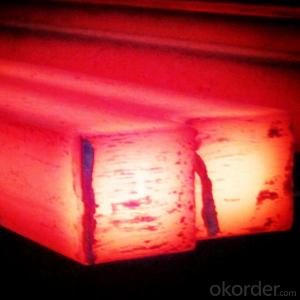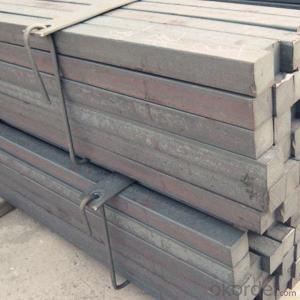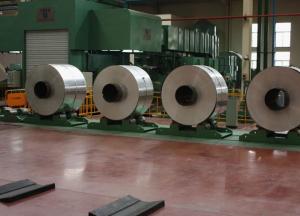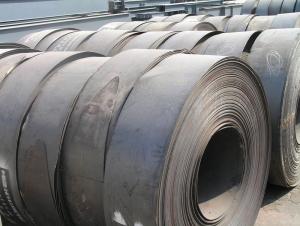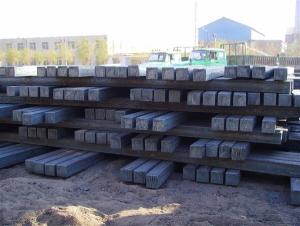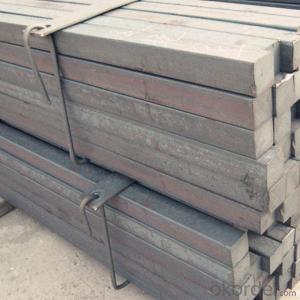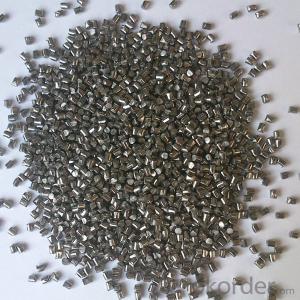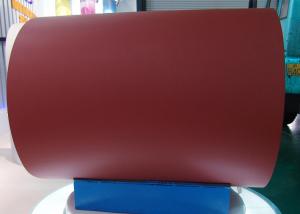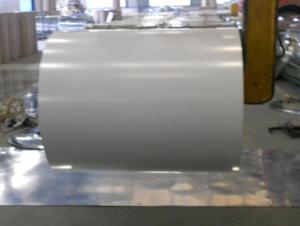Square Steel Bar, Steel Billets Exporter (60X60-150X150),Made in China
- Loading Port:
- China main port
- Payment Terms:
- TT OR LC
- Min Order Qty:
- 23 m.t.
- Supply Capability:
- 100000 m.t./month
OKorder Service Pledge
OKorder Financial Service
You Might Also Like
Item specifice
Product name: Steel billet
1)Application
---Metallurgy
2) Specification (see below)
---Standard: GB/JIS/ASTM
---Size: 80*80mm-150*150mm
---Length: 6-12mtrs or Customised
---Steel material: Q235,Q275,Q345,3SP,5SP,20MnSi
--- Technique: Hot rolled
Standard | C(%) | Mn(%) | S(%) | P(%) | Si(%) |
Q195 | ≤0.12 | ≤0.50 | ≤0.040 | ≤0.035 | ≤0.30 |
Q235 | ≤0.20 | ≤1.40 | ≤0.045 | ≤0.045 | ≤0.35 |
Q275 | ≤0.22 | ≤1.50 | ≤0.045 | ≤0.045 | ≤0.35 |
20MnSi | 0.17-0.25 | 1.2-1.6 | ≤ 0.050 | ≤ 0.050 | 0.40-0.80 |
3SP | 0.14-0.22 | 0.40-0.85 | ≤ 0.050 | ≤ 0.040 | 0.05-0.15 |
5SP | 0.28-0.37 | 0.50-1.00 | ≤ 0.050 | ≤ 0.040 | 0.15-0.30 |
Photos:
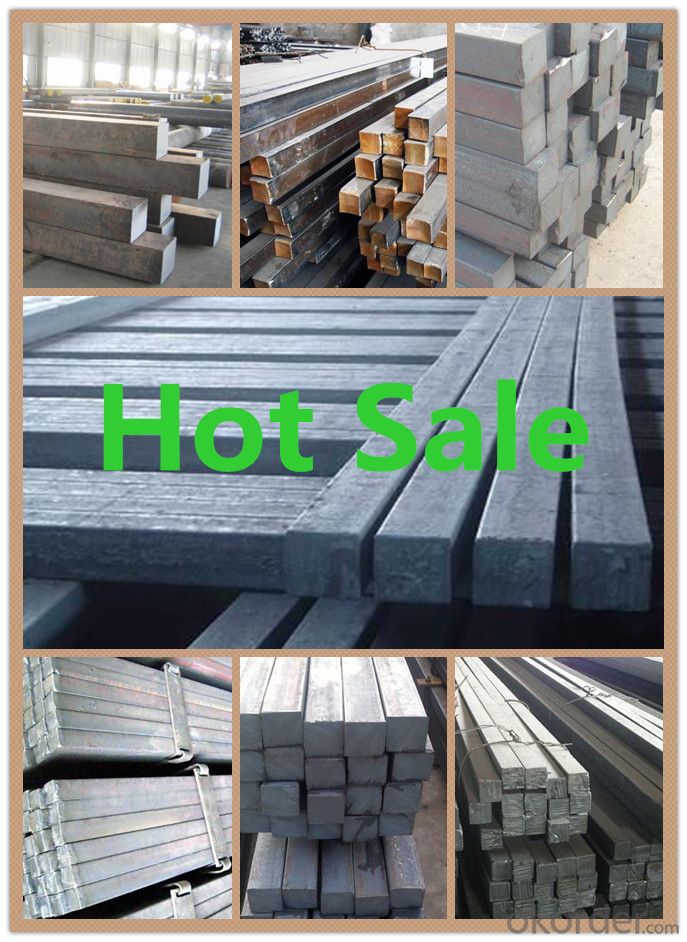
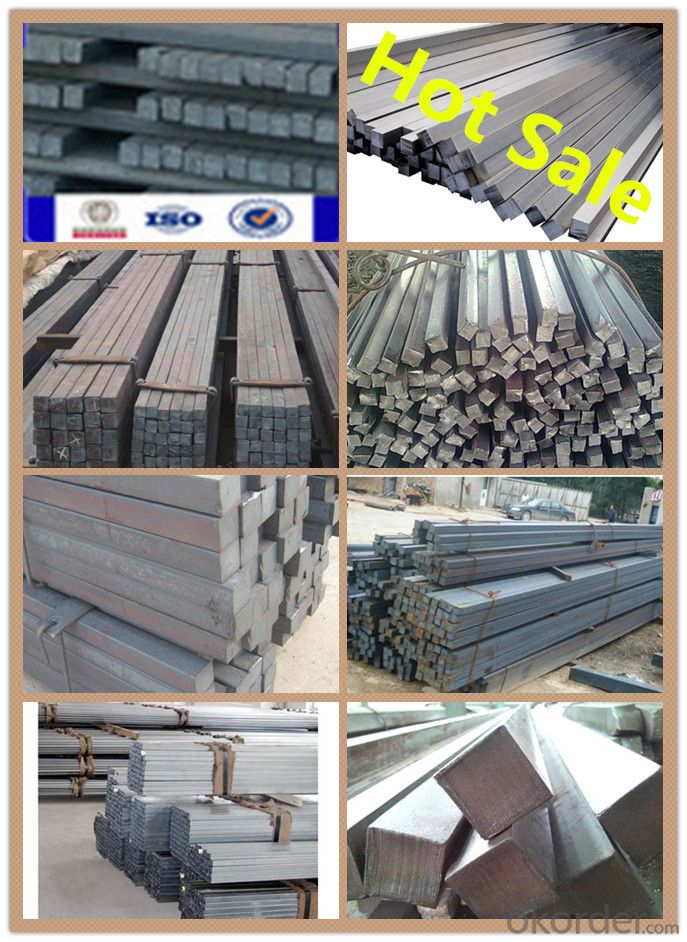
Company Main Product Introduction
·Steel Profile:H-Beam/I-Beam/Equal Angle/Unequal Angle/U Channel /Flat Bar
·Steel Plate:Hot Rolled Coil/Hot Rolled Checkered Coil/Cold Rolled Coil/Cutting Sheet
·Wire Bar: Round Bar /Wire Rod/Deformed Bar
·Steel Pipes: Seamless Pipe, Square/Round Pipes
·Galvanized Steel: Angle/Channel/I-Beam/Round Bar/Flat Bar/Round-Square Pipe
FAQ:
1. Q: Where is your company located? How can I visit there?
A: Our company is located in Beijing, China. Welcome to visit us.
2. Q: Can I get sample and how long will it take?
A:Yes. We can supply sample. And you need to pay for courier.
3. Q: What's the MOQ?
A: Our MOQ is 25mt.
4. Q: What's the delivery time?
A: It will take about 30 days after TT or L/C.
5. Q: What is the payment terms?
A: T/T, L/C at sight
6. Q: How does your factory carry out quality control?
A: We attach great importance to quality control.Every part of our products has its own QC.
7. Q: What certificate do you have?
A: We have SGS, ISO9001 etc. Also we can apply any certificate if you need if the qty is OK.
- Q:What are the advantages of using steel products over other materials?
- There are several advantages of using steel products over other materials. Firstly, steel is known for its exceptional strength and durability, making it highly resistant to wear, tear, and extreme weather conditions. Secondly, steel products have a longer lifespan compared to other materials, reducing the need for frequent replacements. Additionally, steel is a versatile material that can be easily molded and shaped to meet specific design requirements. Moreover, steel is recyclable, making it an environmentally friendly choice. Lastly, steel offers excellent fire resistance, making it a safer option in various applications.
- Q:What are the properties of stainless steel that make it corrosion-resistant?
- Stainless steel is corrosion-resistant due to its high chromium content, which forms a protective oxide layer on its surface. This oxide layer acts as a barrier, preventing the metal beneath from coming into contact with corrosive elements in the environment. Additionally, stainless steel also contains other alloying elements such as nickel and molybdenum, which enhance its corrosion resistance further.
- Q:What are the advantages of using stainless steel in the food and beverage industry?
- One of the main advantages of using stainless steel in the food and beverage industry is its excellent resistance to corrosion. This means that stainless steel equipment and surfaces are less likely to rust, stain, or corrode when exposed to various substances commonly found in the industry, such as water, acids, and food ingredients. Additionally, stainless steel is easy to clean and maintain, as it is non-porous and does not absorb dirt, bacteria, or odors. This makes it a hygienic choice for food processing and handling. Moreover, stainless steel is durable and can withstand high temperatures and mechanical stress, making it suitable for a wide range of food and beverage applications.
- Q:What are the different types of steel products used in the energy sector?
- The different types of steel products used in the energy sector include pipes, tubes, plates, and structural steel. These materials are used in the construction of pipelines, power plants, refineries, and other energy infrastructure. Additionally, stainless steel is commonly used in the production of turbines and other equipment due to its corrosion resistance and high temperature strength.
- Q:What are the advantages of using steel in shipbuilding?
- There are several advantages of using steel in shipbuilding. Firstly, steel is a strong and durable material, which ensures the structural integrity and safety of the ship. Additionally, steel has excellent corrosion resistance properties, allowing ships to withstand harsh marine environments and extend their lifespan. Moreover, steel is readily available and cost-effective, making it a preferred choice for ship construction. Lastly, steel is highly versatile, allowing for efficient customization and modification of ship designs to meet specific requirements.
- Q:How are steel products used in the manufacturing of machinery?
- Steel products are used extensively in the manufacturing of machinery due to their strength, durability, and versatility. Steel is often used to create the structural framework of machinery, as well as various components such as gears, shafts, and bearings. Additionally, steel is used in the manufacturing of machine tools and cutting equipment, ensuring precision and reliability. Overall, steel products play a crucial role in the machinery industry, providing the necessary strength and reliability needed for efficient and effective machine operations.
- Q:How are steel forgings used in heavy machinery and equipment?
- Steel forgings are used in heavy machinery and equipment primarily for their superior strength, durability, and reliability. These forgings, made by shaping and compressing the steel under extreme heat and pressure, provide the necessary structural integrity to handle high loads and withstand harsh operating conditions. They are commonly used in components such as gears, shafts, crankshafts, and connecting rods, ensuring optimal performance and longevity of heavy machinery and equipment.
- Q:How is steel rebar used in concrete construction?
- Steel rebar is used in concrete construction to provide reinforcement and strength to the concrete structures. It is typically placed within the concrete forms before pouring, creating a framework that helps to increase the structural integrity and durability of the concrete. The steel rebar acts as a tension device, absorbing and distributing the forces that act upon the concrete, such as those caused by weight, temperature changes, and natural disasters. This reinforcement helps to prevent cracking, increase load-bearing capacity, and enhance the overall performance and lifespan of the concrete construction.
- Q:How is steel used in the production of tools and machinery?
- Steel is widely used in the production of tools and machinery due to its exceptional strength, durability, and versatility. It is used to create various components, such as blades, gears, shafts, and frames, which require high levels of hardness and resistance to wear and tear. Steel's ability to be heat-treated and shaped into different forms makes it suitable for a wide range of applications in the manufacturing industry, ensuring the production of robust and reliable tools and machinery.
- Q:What are the different types of steel wires and their applications in the telecommunications industry?
- There are several types of steel wires commonly used in the telecommunications industry. These include galvanized steel wire, stainless steel wire, and carbon steel wire. Galvanized steel wire is coated with a protective layer of zinc, making it resistant to corrosion and suitable for outdoor applications such as aerial cables and guy wires. Stainless steel wire is highly durable and has excellent resistance to corrosion, making it ideal for underground cables and marine applications. Carbon steel wire is strong and flexible, making it suitable for various purposes such as reinforcement in fiber optic cables and support structures. Overall, these different types of steel wires play a vital role in ensuring the reliability and longevity of telecommunications networks.
1. Manufacturer Overview |
|
|---|---|
| Location | |
| Year Established | |
| Annual Output Value | |
| Main Markets | |
| Company Certifications | |
2. Manufacturer Certificates |
|
|---|---|
| a) Certification Name | |
| Range | |
| Reference | |
| Validity Period | |
3. Manufacturer Capability |
|
|---|---|
| a)Trade Capacity | |
| Nearest Port | |
| Export Percentage | |
| No.of Employees in Trade Department | |
| Language Spoken: | |
| b)Factory Information | |
| Factory Size: | |
| No. of Production Lines | |
| Contract Manufacturing | |
| Product Price Range | |
Send your message to us
Square Steel Bar, Steel Billets Exporter (60X60-150X150),Made in China
- Loading Port:
- China main port
- Payment Terms:
- TT OR LC
- Min Order Qty:
- 23 m.t.
- Supply Capability:
- 100000 m.t./month
OKorder Service Pledge
OKorder Financial Service
Similar products
New products
Hot products
Related keywords
